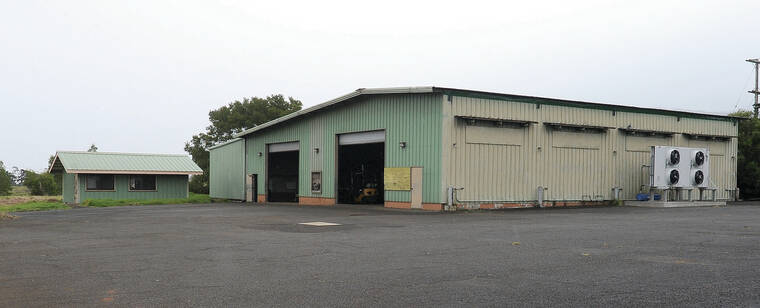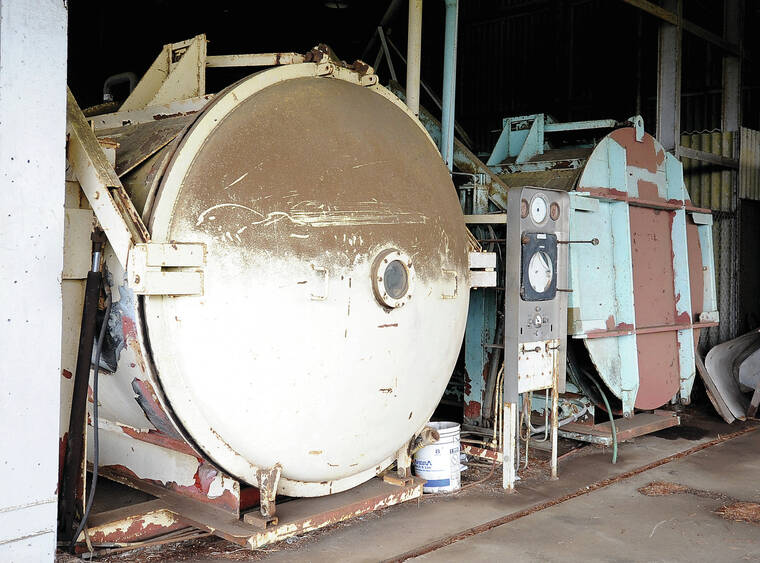Farmers in Waimea are one step closer to having a refurbished food processing facility after the partial demolition of the Kamuela Vacuum Cooling Plant.
The plant is located on a 3.675 acre parcel in Waimea, owned by the State Department of Agriculture, and leased by the Kamuela Vacuum Cooling Cooperative. The cooperative entered into the lease agreement in 1993 for a term of 35 years. The cooperative’s members pay a $200 annual membership fee to use the facility in addition to a usage rate, which is calculated per pound of produce that is vacuum-cooled or refrigerated.
Vacuum cooling is a rapid cooling technique that is mainly achieved through evaporation of part of the moisture of the product under vacuum.
The advantages of vacuum-cooling include shorter processing time, extended product shelf life, and improved product quality and safety.
The Master Plan Feasibility Study for the plant was published in 2019 and noted approximately 61% of all farms in the state are located on the Big Island.
“The Kamuela Vacuum Cooling Plant is an important agricultural facility that supports the farmers in Waimea,” said Department of Agriculture Public Information Officer Janelle Saneishi. “The availability of updated infrastructure, as well as refrigeration and cooling equipment, allows farmers to share in the use of costly equipment and facilities. Facilities that support farmers will help move the state towards its goals of food sustainability.”
The first step in the plant’s rehabilitation was the demolition of the abandoned vacuum-cooling structures which contained lead-based paint and asbestos.
The buildings were taken down within the last two weeks, and the remaining ancillary work is expected to be complete this summer.
The abandoned structures were built in 1968 and were only used as shelter and storage of miscellaneous materials.
“I was there meeting with the farmers last week, and I was very pleasantly surprised that it was coming down. We can’t build something if that’s in the way, so at least we are making progress,” said Sen. Tim Richards, whose district includes Waimea.
After completion of the demolition, the next phase will upgrade the existing vacuum-cooling facility for Food Safety Modernization Act compliance.
The Food Safety Modernization Act was signed into law in 2011 as a means of supporting and protecting the production and consumption of fresh and local produce. While the rules under this act will affect farmers throughout all stages of farming, the Produce Safety rule and the Preventative Controls for Human Food rule are the primary regulations that will affect the stages and processes that occur at the Kamuela Vacuum Cooling Plant, the study reports.
The final step in the plant’s planned rehabilitation will be the addition of a certified commercial kitchen.
Based on responses from the community through a mail-in survey and focus group meetings, a certified commercial kitchen was the most desired resource respondents would be interested in using at the cooling plant site.
They also indicated that they would like the kitchen to provide equipment to do canning, chopping, prepping, dehydrating and hosting cooking classes.
The proposed commercial kitchen would provide three different types of kitchens for rental: one baking kitchen, one prep kitchen and two cooking kitchens. The baking and prep kitchens will be 300 square feet, while the cooking kitchens will be 500 square feet.
Saneishi said the DOA is currently focusing on the demolition phase, with the remaining phases to “be considered at a later date.”
In 2019, the state estimated the commercial kitchen would cost $1.8 million.
“Funding is a big issue with the certified commercial kitchen. Generally speaking, it’s a good plan, but I think we will have to go back and refine it,” said Richards. “A certified kitchen would be wonderful because we could get cottage industries going, and I think we would use it a lot more than I think we even know. I think we have to look at that master plan and retool it.”
He said instead of the state solely funding the kitchen through capital improvement money, sources from different federal agencies and private partnerships need to be explored.
“We need to look under every rock,” he said.
In November 2021, former Gov. David Ige released $700,000 in state capital improvement project funds to demolish a warehouse, the clearing of related environmental hazards, and for upgrades at the plant.
In 2019, the estimated cost for demolition was $450,000, and Food Safety Modernization Act compliance upgrades were projected to cost $124,000.
The actual cost of the winning bid for demolition awarded in May was $578,100.
Richards said it was important to support farmers in order to achieve food security.
“A bunch of those farmers are young. They’re in their late 30s early 40s. We have generational changes here. We need to support them. This is one of the things I’ve been a huge advocate for and beating the drum. That’s why we need to support this group because they are actually making a very conscious effort, but the state needs to support Lalamilo and the vacuum-cooling ind infrastructure,” he said. “Farming will happen, but we have to support the infrastructure to help them be successful.”
Richards said he has been advocating for a master plan for agriculture. The last countywide assessment of agriculture was prepared in 2012.
“We don’t know where we are going to go, if we don’t know where we are right now. We say we are going to double food production, but how much are we producing now?” he commented. We need these numbers to start planning. We have to build for the future.”






